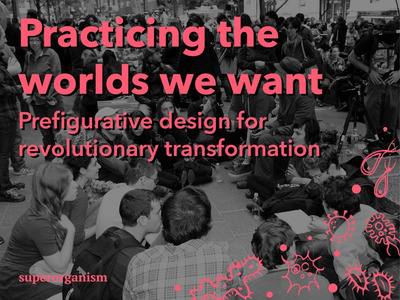Practicing the Worlds We Want: Prefigurative design for revolutionary transformation
Lutterman, Ariana and Campbell, Tara (2020) Practicing the Worlds We Want: Prefigurative design for revolutionary transformation. In: Proceedings of Relating Systems Thinking and Design (RSD9) 2020 Symposium., 9-17 Oct 2020, Ahmedabad, India.
Preview |
Text
Lutterman_Practicing_RSD9_2020.pdf Available under License Creative Commons Attribution Non-commercial No Derivatives. Download (1MB) | Preview |
![Lutterman_Practicing_RSD9_2020.png [thumbnail of Lutterman_Practicing_RSD9_2020.png]](https://openresearch.ocadu.ca/3635/2.hassmallThumbnailVersion/Lutterman_Practicing_RSD9_2020.png)  Preview |
Image
Lutterman_Practicing_RSD9_2020.png Available under License Creative Commons Attribution Non-commercial No Derivatives. Download (2MB) | Preview |
Abstract
Background
From our experience as systemic designers engaging with various practices, particularly with several forms of systems mapping (e.g., Jones & Bowes, 2017) and transition design (Irwin et al., 2015), we have found that these practices favour analytical and strategic approaches to working for systems change. These approaches attempt to deeply understand a system through various kinds of analyses and then design strategies to to shift it, placing change in the future as an outcome.
Through collaborative reflection, we have developed a desire to see these approaches complimented by prefigurative approaches where change is embodied in the design process (Campbell & Lutterman, 2019). Prefigurative design involves the manifestation of a desired future into present practices (Asad, 2018). To practice prefiguratively for systemic transformation is to form our process as a reflection of the desired transformation. Like prefigurative politics from which these ideas are inspired, prefigurative design “is both an expressive and experimental endeavor. Through the processes of enactment, we not only indicate the social relations we desire; we also test what works, and does not work, in the construction and maintenance of those social relations” (Disalvo, 2016).
Understanding that the transformed state of a desired system should inherently look and function differently from its present state, a prefigurative approach recognizes that practices intended to transform must similarly expand beyond the practices formed within the dominant system. We draw on inspiration from Audre Lorde (1984): “the master’s tools will never dismantle the master’s house.” In this understanding, transformed systems require transformed practices. Conway’s Law (1968) echoes this in stating that “any organization that designs a system will inevitably produce a design whose structure is a copy of the organization’s communication [or design] structure.” In the words of adrienne maree brown (2017), “what we practice at the small scale sets the patterns for the whole system.” From Donna Haraway (2016): “it matters what thoughts think thoughts.” The ways we create change in turn create (or preclude) the possibilities for how that change will emerge. It matters what designs design design.
Mariam Asad (2019) notes that “prefigurative design is not meant to be an overarching framework or prescriptive model to determine individual research projects.” Prefigurative design is instead an orientation through which researchers, designers, community members, and other systems actors can articulate and align their processes with a shared vision. Our workshop will build on Asad’s (2019) phases of prefigurative design, “envisioning, acting presently, and building counter-institutions.” We elaborate on these phases by providing activities for systemic designers to assess the prefigurative nature of their current practice, envision their desired future, and determine how they can practice differently to enact a prefigurative politics.
Our activities will be inspired by a variety of well-known design – and foresight-related methods such as causal layered analysis (Inayatullah, 2004) but will centre around a method we have developed specifically for prefigurative practices, principles-based design. Principles-based design is a process of developing principles which can be intentionally applied during a design process and against which the design process can be evaluated. These principles guide and inform design decisions and actions. This process begins by distilling a desired future into core values which can be translated into principles for design practice. To develop vision-oriented principles, we follow the GUIDE criteria for effective principles (Patton, 2017).
According to GUIDE:
a “high-quality principle image (1) provides guidance, (2) is useful, (3) inspires, (4) supports ongoing development and adaptation, and (5) is evaluable” (p. 36).
We will take our workshop participants through an activity to create principles aligned with their own desired futures, guiding them toward prefigurative practice.
Our workshop fits primarily within the Methodology, philosophy and theory of systemic design track, but it would also fit well within the track on Systems for equity, collectivism, co-design and citizen movements.
Workshop Structure
The three main workshop phases, Assessing, Envisioning, and Practicing Differently will include a mix of short presentations, small group discussions in breakout rooms, whole group discussions, participatory idea generation on a collaborative whiteboard platform, and individual reflection.
The phases will explore the following questions:
Assessing: What kind of future does my current practice prefigure?
Envisioning: What is my/our desired future? What does systemic transformation look like?
Practicing Differently: How can I manifest my/our desired future in my design practice? How do we continuously practice prefigurative design? What aspects of my current practice can be revised?
Goal/Expected Outcome
Participants will leave the workshop with an awareness of what a prefigurative orientation could mean for their own practices and methods to begin evaluating and engaging with the prefigurative elements of their practice. They will have developed critical and reflective relationships with other participants and with us, the workshop facilitators.
| Item Type: | Conference/Workshop Item (Other) |
|---|---|
| Divisions: | Faculty of Design |
| Date Deposited: | 06 May 2022 14:02 |
| Last Modified: | 06 May 2022 14:15 |
| URI: | https://openresearch.ocadu.ca/id/eprint/3635 |
Actions (login required)
 |
Edit View |

 Lists
Lists Lists
Lists